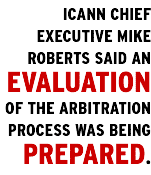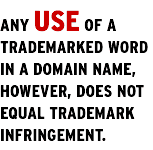| |||||||||

Groups cite bias in domain name arbitration
 A new coalition says legitimate mom-and-pop e-businesses are losing their domain names to larger companies at an alarming rate. A new coalition says legitimate mom-and-pop e-businesses are losing their domain names to larger companies at an alarming rate. A lobbying campaign is being launched by relatively new groups including the Association for Domain Owners' Rights, the Top-Level Domain Lobby and KeepYourDomain.com. These groups say an inherent bias exists in three arbitration providers launched last December by the Internet Corporation for Assigned Names and Numbers (ICANN). Few people question the new arbitrators' decisions reversing "cybersquatting." Cybersquatters are those who register trademarked names just so they can resell them to the trademark owners. The domain owners' coalition, however, says many arbitrators' decisions have upended real businesses that have nothing to do with cybersquatting. Under the Uniform Dispute Resolution Policy adopted by ICANN's board, trademark owners can only take away names that someone else is using "in bad faith." A sign of bad faith is registering a name "primarily for the purpose of selling" it to a trademark holder. Any use of a trademarked word in a domain name, however, does not equal trademark infringement. Legally, a trademark owner cannot stop all use of a word (or prevent noncommercial uses).
For example, at least seven businesses in four different countries hold trademarks on the term "FiberShield." The uses of this term for insulation, swimming pool covers and other products legally coexist. The new domain owners' coalition is crying "foul" over arbitrators' decisions on this name and others: • FiberShield.net was registered by a Canadian company that had operated for several years under the name Fiber Shield Ltd. without registering it as a trademark. ICANN's policy states that domain names cannot be taken away if a business has been "commonly known by the domain name, even if you have acquired no trademark." Despite this, the name was canceled by arbitrators upon request of the U.S. trademark owners of another domain name, Fiber-Shield.com. • ProzacPages.com was registered, according to an arbitrator's decision, as "a non-profit site" designed to "attempt to help others to understand…the nature of severe depression." The site didn't sell anything commercially, being purely for social comment on mental health. But arbitrators transferred the name to pharmaceutical company Eli Lilly, owner of the trademark Prozac. • Crew.com was registered by a Washington, D.C., company that was invited by sportswear retailer J. Crew International to join its affiliate network. According to the arbitrator's findings of fact, J. Crew initially encouraged the young site, promising "a commission for sales" generated by banners. The mood then changed and the firm sought to take the domain name from its owner. The arbitration panel agreed to do so. This last case is especially interesting because it provoked a livid protest from one jurist on the three-member arbitration panel. In a dissent attached to the case, trademark attorney G. Gervaise Davis III denounced "the biased test the panel has used." He wrote that the arbitrators created "a dangerous and unauthorized situation whereby the registration and use of common generic words as domains can be prevented by trademark owners." The ICANN arbitration provider that seems the harshest toward defendants is WIPO, the World Intellectual Property Organization. In the first half of 2000, WIPO awarded plaintiffs 84 percent of the names they sought. By contrast, another arbitrator, eResolution, awarded plaintiffs only 47 percent of the disputed names it ruled on. Plaintiffs are allowed to choose which provider will decide their case, and the wind is shifting. In the first quarter of this year, WIPO received only 46 percent of the cases submitted. By the second quarter, WIPO was processing the majority: 54 percent. Mike Roberts, ICANN's chief executive, said in an interview that an evaluation of the arbitration process was being prepared, and, "We'll look at it in 12 months." The report is expected in November 2000. Let's hope some of the Web sites facing arbitration can make it that long. Consumer advocate Brian Livingston appears at CNET News.com every Friday. Do you know of a problem affecting consumers? Send info to tips@BrianLivingston.com. He'll send you a book of high-tech secrets free if you're the first to submit a tip he prints. on the soapbox |
|
|||||||||||||||||||||||
|
Send us news tips | Contact Us | Corrections | Privacy Policy |
|

